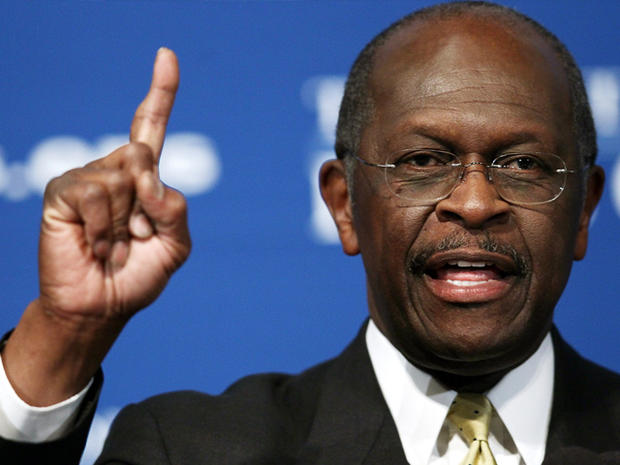Is Herman Cain taking scandal from bad to worse?
Republican presidential candidate Herman Cain's inconsistent statements in the wake of revelations that he was accused of sexual misconduct in the 1990s are complicating his efforts to move on from the incendiary story - and may prompt voters who would otherwise have discounted the allegations to reconsider.
During his initial media interviews on Monday, Cain said that he was unaware if the National Restaurant Association, which he headed during the 1990s, had paid a financial settlement to a female employee or employees who had accused him of sexual misconduct. Politico reported Sunday that at least two women complained about Cain's behavior and ultimately left the group. The woman reportedly received financial payouts and agreed not to discuss the reason they left.
"If the Restaurant Association did a settlement, I am not - I wasn't even aware of it and I hope it wasn't for much, because nothing happened," Cain told Fox News around midday on Tuesday. At the National Press Club, he said he was "unaware of any settlement."
But by the time Cain sat down for a different Fox News interview later in the day, as well as an interview with PBS NewsHour, he had changed his tune. Saying facts had "come about during the day as I have tried to recall what happened back then," Cain said his accusers had indeed received cash settlements. While he didn't recall signing a settlement document, he said, that didn't mean he didn't sign one.
"I was aware that an agreement was reached," Cain acknowledged on NewsHour. On Fox, he even characterized the amount of the settlement with one woman, suggesting it was worth "maybe three months salary," and said he had discussed the amount with his general counsel at the time.
On Tuesday morning, Cain told conservative radio host Laura Ingraham that he was "not changing the story, but trying to fill as many details as I could possibly recall."
On HLN (formerly CNN's Headline News), Cain also suggested that there was an issue with wording, drawing a distinction between the words "settlement" and "agreement."
"It was an agreement. So it looked like I had changed my story. I didn't change my story," he told HLN's Robin Meade. "The difference between settlement and agreement, it makes a difference to me."
Asked if he had been reminded of what had happened, he replied, "No I just started to remember more. This was not exactly something that I had top of mind."
"Remember this was 12 years ago, and I was trying to recollect this in the middle of an already busy planned day. A major speech in the morning. A major luncheon speech at the Press Club," Cain added.
Cain's comments has shifted the storyline from the initial allegations to his seeming inconsistency in discussing them - which could ultimately be more damaging. The story itself may not be hurting Cain too much: The Des Moines Register asked 20 of the caucus-goers who backed Cain in its recent poll (which showed Cain leading his GOP rivals in the state) if the allegations would cause them to reconsider. None of them said it would.
But consider the comment by Steve Scheffler, president of the Iowa Faith & Freedom Coalition, who said Cain "has to lay all his cards on the table now and tell all truthfully." Or the skepticism of Influential Iowa Republican Bob Vander Plaats, who said in the wake of Cain's initial comments, "it's awfully hard for CEOs to not know if there's a settlement or not a settlement."
This is where the bigger problem may exist for Cain, assuming the story doesn't get any uglier. It's one thing to be accused of what one Iowa voter deemed "rumors and innuendo [that] just seem to me to be a little suspect." (According to Cain's campaign, there has been something of a rallying-around effect in the wake of the allegations, with the campaign taking in a quarter million dollars in a single day.) It's something else, however, to seem like you are dissembling instead of being straightforward about what took place. Even before the allegations surfaced, Cain was earning a reputation for inconsistency on abortion, prisoner exchange involving terrorism suspects, an electrified border fence and even his vaunted 9-9-9 plan, which he tweaked following criticism.
Remember, the initial claims against Cain really weren't even particularly damning: The women involved had not come forward, no documentation was made public, and the alleged sexual misconduct was vague. Cain could have gotten his story straight from the outset, hammered it home and said he was moving on. Instead he went ahead with a media blitz before he was sure what he wanted to say - and thus pushed the story forward instead of helping put it to bed. (The story may ultimately remain in the headlines because of events outside of Cain's control, of course, particularly if the women involved come forward. But that doesn't change the fact that Cain's damage control efforts haven't helped his cause.)
It's the latest sign that Cain might not be in the same league as rivals Mitt Romney and (to a lesser extent) Rick Perry when it comes to running a presidential campaign. Perhaps that's no surprise: Cain, who has never held elective office, has been at the top of a seat-of-the-pants effort grounded more in the candidate's magnetism than on the fundraising, discipline and organization traditionally associated with a successful campaign. Cain says he is throwing out the old rulebook when it comes to running for president, and he has thus far shown a remarkable ability to stay at the top of the polls despite missteps that would likely have severely damaged his rivals. If Americans start to think Cain plays fast and loose with the facts, however, his charmed candidacy might not be able to recover.

